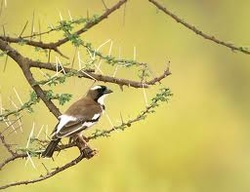
Singing in male birds has traditionally been seen as a signal of quality and is used in many species as a method of mate attraction. This behaviour has recently started to receive a lot of attention due to the effects of anthropogenic lighting, such as street lights, on the calling behaviour of birds that live in urban areas. However, the study by York et al took place in the Kalahari, a natural habitat with limited anthropogenic lighting, and they investigated the effects of the moons light on singing. The study found that :
"Males started singing earlier when the moon was full compared with when it was new, as long as the moon was above the horizon at dawn. During these exposed full moon dawns, males sang over a longer performance period and produced more song during that period compared with exposed new moon dawns."
The authors highlight the links of their study with research on anthropogenic light effects, which can produce reproductive benefits as males sing earlier. They point out that their research suggests that the sensitivities that allow birds to adapt to lighting in cities may have evolved to take advantage of the natural variation in light provided by the moon.
This is a really interesting study that takes a novel approach to look at a well studied area of avian behaviour, and it poses questions about what researchers should be thinking about when they study singing in the wild....they need to keep track of the moon!
York, Young & Radford (2014) Singing in the moonlight: dawn song performance of a diurnal bird varies with lunar phase. Biology Letters, 10:20130970
It is well established that the lunar cycle can affect the behaviour of nocturnal animals, but its potential to have a similar influence on diurnal species has received less research attention. Here, we demonstrate that the dawn song of a cooperative songbird, the white-browed sparrow weaver (Plocepasser mahali), varies with moon phase. When the moon was above the horizon at dawn, males began singing on average 10 min earlier, if there was a full moon compared with a new moon, resulting in a 67% mean increase in performance period and greater total song output. The lack of a difference between full and new moon dawns when the moon was below the horizon suggests that the observed effects were driven by light intensity, rather than driven by other factors associated with moon phase. Effects of the lunar cycle on twilight signalling behaviour have implications for both pure and applied animal communication research.
http://rsbl.royalsocietypublishing.org/content/10/1/20130970.short
For more information on this cool study system click on this link: Sparrow-Weaver Project

 RSS Feed
RSS Feed
